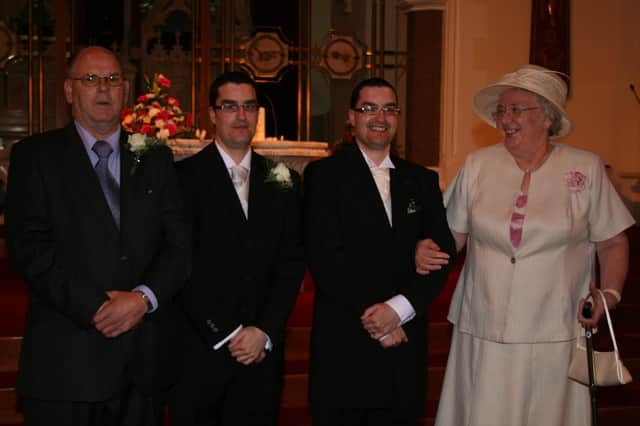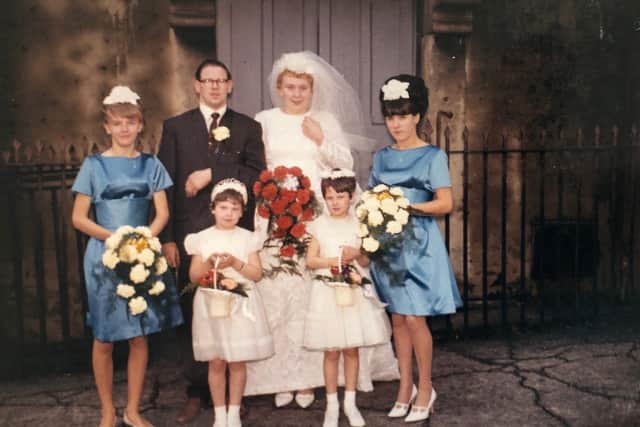Co Londonderry family open up on the impact of caring for their late mother who had dementia


Alan Bayles, who lives in Castledawson, said his mother Marjorie, known was Madge, was diagnosed with frontotemporal dementia (frontal lobe dementia) in September 2022.
Within a short time, Madge, from Co Durham, lost 75 per cent of her short-term memory, but it wasn’t until the end of February 2023 that her condition really started to deteriorate rapidly.
Advertisement
Hide AdAdvertisement
Hide AdAlan’s brother David was Madge’s main carer until she moved into a care home.


“My brother had so many hurdles to overcome,” said Alan.
"He slept with one ear open for months in case she got up and fell. Her mobility was badly affected, and the layout of the house wasn’t suitable for the care equipment she eventually needed.
“It took a full hour in the morning just to get her up out of bed and needed two people to lift her. David was very tired, was still working, although his employers were very good and he was able to work from home. He was also having to deal with all the admin like sorting out power of attorney and dealing with the bank etc. “My wife and I did some respite care for two weeks to enable David to get away for a break and it was very draining as her condition deteriorated even during that short period of time.”
Alan added: “During March and April her condition deteriorated even further to the point where it not only affected her speech, but also her coordination and physical ability, making it impossible to feed, change or bathe herself without assistance.
Advertisement
Hide AdAdvertisement
Hide Ad"By the middle of April, things became so bad that David was forced to make the heart-wrenching decision to admit mum into a care home, so that she could receive the care she deserved. Sadly, six weeks after being admitted, her condition deteriorated even further and she lost the ability to swallow. The decision was taken to withdraw her medication, food and liquids and she was commenced on end-of-life care. My mum fought bravely but she passed away on 2nd June with my brother holding her hand as she took her final breath.”
The Bayles family are sharing their experience as new research suggests that four out of five unpaid carers in Northern Ireland are taking on the bulk of caring responsibilities for people with dementia
An Alzheimer’s Society survey of unpaid current and former carers of people with dementia here reveals that family and friends are the backbone of their support.
It found that 85 per cent of carers in Northern Ireland classed themselves as primary carers, taking on the majority of caring responsibilities for their loved one.
Advertisement
Hide AdAdvertisement
Hide AdSpending on average four working days a week (26.7 hours) providing essential practical and emotional support, the impact of unpaid caring duties comes at a price, with a quarter going as far to say they feel they have lost their identity.
The survey revealed the isolation felt by unpaid carers of people living with dementia. A quarter revealed they lost friends and lacked frequent social contact with others, saying that just one regular phone call from family or friends would have helped them cope. Three in 10 also said they didn’t have anyone they felt they could go to for help.
Around half of those surveyed have had to juggle caring duties with working full time, with one in six forced to reduce working hours.
Caring duties have also taken people away from their family and homes, with a fifth of respondents who have, or are currently, staying the night at least once a week, spending less time with their partner or spouse. Over two-fifths said their caring duties put a strain on their relationship.
Advertisement
Hide AdAdvertisement
Hide AdThe Alzheimer’s Society is encouraging people to sign up to a Memory Walk, which sees thousands of people walk for, or in memory of, a loved one with dementia. Funds raised will go towards vital campaigning efforts and support services desperately needed by people who have been devastated by dementia, including carers.
Alan and his wife Monica will be taking part at the Alzheimer’s Society Memory Walk at Ormeau Park on September 23, in memory of his mum.
“We’ll be walking the Belfast Memory Walk at Ormeau Park to help raise money for research, in the hope that we can live in a world where dementia no longer devastates lives.”
Alzheimer’s Society Northern Ireland country manager Barry Smyth said: “There are so many family members and friends providing care around-the-clock to keep their loved ones tethered to the world. This vital care can be incredibly rewarding but comes at a cost – often coping with changes to behaviour and carrying out daily tasks many of us take for granted.
Advertisement
Hide AdAdvertisement
Hide Ad“By signing up to one of our Memory Walks, we can continue to provide help and hope to everyone who has been devastated by dementia.
"We see thousands of people, all connected by similar experiences, coming together, which is always incredible to witness. From the buzz of the crowd to the hug of a stranger who gets it - whatever you feel on the day, you won't be alone.”
To sign up to an Alzheimer’s Society Memory Walk, taking place across 24 locations this September and October, visit memorywalk.org.uk